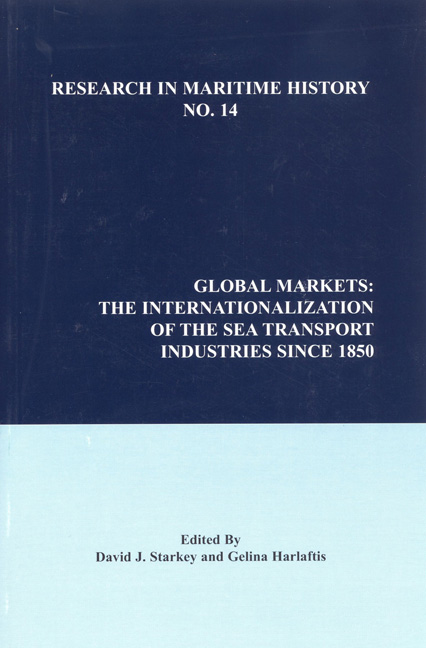Book contents
- Frontmatter
- Contents
- About the Editors
- Contributors
- Introduction
- “International Freight Markets in the 1830s and 1840s: The Experience of a Major Finnish Shipowner”
- “The First (and Very Secret) International Steamship Cartel, 1850-1856”
- “Competition or Co-operation in the Global Shipping Industry: The Origins and Impact of the Conference System for British Shipowners before 1914”
- “National Alliances and Global Webs: The Internationalization of Japanese Shipping”
- “Dutch Sea Transport in Transition: The German Hinterland as Catalyst, 1850-1914”
- “The Expansion of American Interests in Transatlantic Commerce and Trade, 1865-1893”
- “The Expansion of Japan's Shipping Interests before the Sino-Japanese War”
- “Cooperation and Reorganization on the North-South Routes from Japan in the Interwar Period”
- “The Global Communications Industry and Its Impact on International Shipping before 1914”
- “The Nineteenth-Century Roots of Globalization: Some Technological Considerations”
- “The Global Fish Market: Internationalization and Globalization, 1880-1997”
- “Convergence or National Styles? The Japanese Challenge to the British-Norwegian Hegemony in the Twentieth-Century Whaling Industry”
- “International Trends and Greek Shipping: The Business Strategy of Demetrios Moraitis, 1893-1908”
- “Organizational and Managerial Patterns of Greek- Owned Shipping Enterprises and the Internationalization Process from the Internar Period to 1990”
- “Internationalization and the Collapse of British Shipbuilding, 1945-1973”
- “Globalization and International Competitiveness: The Experience of the Japanese Shipping Industry since the 1960s”
- “Containerization and the Globalization of Liner Shipping“
“Globalization and International Competitiveness: The Experience of the Japanese Shipping Industry since the 1960s”
- Frontmatter
- Contents
- About the Editors
- Contributors
- Introduction
- “International Freight Markets in the 1830s and 1840s: The Experience of a Major Finnish Shipowner”
- “The First (and Very Secret) International Steamship Cartel, 1850-1856”
- “Competition or Co-operation in the Global Shipping Industry: The Origins and Impact of the Conference System for British Shipowners before 1914”
- “National Alliances and Global Webs: The Internationalization of Japanese Shipping”
- “Dutch Sea Transport in Transition: The German Hinterland as Catalyst, 1850-1914”
- “The Expansion of American Interests in Transatlantic Commerce and Trade, 1865-1893”
- “The Expansion of Japan's Shipping Interests before the Sino-Japanese War”
- “Cooperation and Reorganization on the North-South Routes from Japan in the Interwar Period”
- “The Global Communications Industry and Its Impact on International Shipping before 1914”
- “The Nineteenth-Century Roots of Globalization: Some Technological Considerations”
- “The Global Fish Market: Internationalization and Globalization, 1880-1997”
- “Convergence or National Styles? The Japanese Challenge to the British-Norwegian Hegemony in the Twentieth-Century Whaling Industry”
- “International Trends and Greek Shipping: The Business Strategy of Demetrios Moraitis, 1893-1908”
- “Organizational and Managerial Patterns of Greek- Owned Shipping Enterprises and the Internationalization Process from the Internar Period to 1990”
- “Internationalization and the Collapse of British Shipbuilding, 1945-1973”
- “Globalization and International Competitiveness: The Experience of the Japanese Shipping Industry since the 1960s”
- “Containerization and the Globalization of Liner Shipping“
Summary
While ocean-going shipping has always been international in character, the management of the resources it utilizes — especially in terms of the registration of vessels and the origins of employees afloat and ashore — have generally been organized on a national basis. The Japanese shipping industry typified this pattern after the Second World War. However, since the mid-1960s a process of globalization — defined for present purposes as the cross-border procurement and utilization of productive resources — has occurred, leading to the multi-nationalization of fleet assets, seamen and the management resources employed by shipping companies. This chapter examines the causes and consequences of this process.
Globalization has become an urgent concern in advanced shipping countries because the cross-border procurement of resources invariably entails a decrease of domestic investment and employment, and impedes the development of a reservoir of skilled seafaring labour: this process is known as the “hollowing out“of an industry. In this respect, the Japanese Ministry of Transport (MoT) stated in a White Paper on shipping in 1996 that Japan's ocean-going shipping industry is characterized by the greatly advanced state of the hollowing out process, compared with manufacturing industries. According to this report, only eleven percent of the ships of 2000 grt and over operated by the five largest Japanese shipping companies were registered in the country, while Japanese citizens accounted for only twelve percent of the labour force engaged in these vessels. The government thus identified as urgent the need to arrest the hollowing out of shipping, and has recently established a Japanese international ship system. However, Japan's experience begs two important questions: does globalization in shipping inevitably lead to the hollowing out of the industry in the countries concerned? and while the phenomenon of hollowing out implies that there will be a loss of international competitive advantages, has this been true in the case of the Japanese shipping industry?
In the first part of this chapter, the impact of the globalization process on Japan's ocean-going shipping is outlined, the emphasis being placed on how ocean-going shipping firms, the seamen's union and the MoT coped with the circumstances and causal factors of globalization. An attempt is made to identify the key features of the globalization of Japan's shipping industry, and to view the process from an historical perspective.
- Type
- Chapter
- Information
- Global MarketsThe Internationalization of The Sea Transport Industries Since 1850, pp. 355 - 384Publisher: Liverpool University PressPrint publication year: 1998



